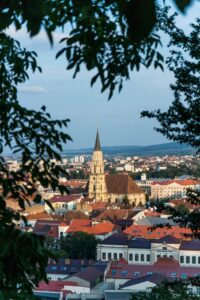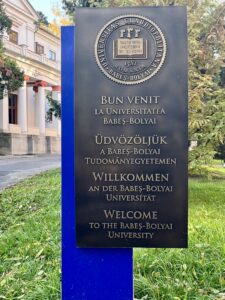The summer school is organised within the SCEWERO project (GA 101159497). Coordinated by the University of Antwerp and organised together with Babes-Bolyai University, Euro-Mediterranean Centre on Climate Change, and Justus Liebig University for students and young researchers in Romania and other widening countries. The summer school will be organised as an in-person event and will be hosted by the Babes-Bolyai University in Cluj-Napoca, Romania.
We are pleased to announce that we have received over 70 applications for the 15 available grants. The selection process has been completed, and all selected participants have been notified individually via email.
For updates and further information about our project, please follow us on our official social media channels.
Climate change is seen as one of the biggest challenges of our time. As extreme temperature and precipitation events, especially compound events, are among the most impactful, with this summer school, we aim to equip participants with new methodologies to assess their intensity and frequency and conduct climate change impact studies. During summer school, organised by the SCEWERO project, young researchers and students in climate, hydrology and environmental studies will be able to gain practical experience with processing and analysing climate and hydrological data to assess extreme weather events.
With this summer school, we aim to:
- Get more knowledge about the various types of climate data and tools/methods to process/analyse them for extreme weather events and get experience in using these tools/methods/data;
- Learn what is needed for interdisciplinary impact/adaptation studies on climate change;
- Broaden network on extreme temperature and precipitation events, including compound extremes and impact assessments.
The summer school is organised in four sessions:
- Heatwave session: This session will focus on science, tools, long-term trends, regional context, national datasets, and shortcomings. A dedicated slot will be allocated to the seasonal forecast of heatwaves based on dynamical and AI-driven approaches
- Drought session: the main topics are on drought science, tools, indices, datasets, drivers, forecasting, historical and future trends
- Floods session: topics covered by this session include indices, datasets, drivers, forecasting, historical and future trends.
- Compound extremes session: it will cover information and tools to assess compound extremes and their impacts on socioeconomic development
Hands-on activities will complement sessions. For detailed information, please check the Summer School program.
During each day, poster sessions will be organised during coffee breaks, and participants can present their previous activity related to summer school topics.
- Climate, hydrology, and environmental studies students (Post-doctoral, PhD, and MSc) and young researchers in Europe according to the Horizon Europe regulation.
- We aim at 20 participants
- Affiliation in widening countries could be an advantage.
- The working language during the summer school will be English.
- The schools will be organized on 9-11 September 2025
- Registration deadline: May 30, 2025.
- Participants’ notification on acceptance: June 17, 2025.
The venue of the summer school is Babeș-Bolyai University, Faculty of Geography, Cluj-Napoca, Romania.





Dr. Enrico SCOCCIMARRO

Short Bio
Enrico Scoccimarro is a senior scientist at the Euro-Mediterranean Center on Climate Change (CMCC) and director of its “Climate Variability and Prediction” division. With over 25 years of experience in climate modelling, he specializes in the interaction between atmospheric and oceanic systems in General Circulation Models (GCMs).
He has contributed to the development of several GCMs and participated in major climate projection initiatives, including CMIP3, CMIP5, and CMIP6. His research focuses on extreme weather events, particularly Tropical Cyclones, and their role in the climate system. He has held leadership roles in numerous EU-funded projects and served on key scientific panels, including the US-CLIVAR Hurricane Working Group and the MEDCYCLONES network. Enrico has taught at Cà Foscari University and holds national qualifications as Associate and Full Professor in Geophysics.
He has authored over 85 peer-reviewed papers.

Prof. Hossein TABARI
University of Antwerpen, Belgium
Prof. Elena XOPLAKI
Justus LIEBIG University, Germany
The organisers will cover lunches and coffee breaks on all days and the kick-off dinner on September 9. Participants should cover travel, accommodation and other related costs.
For doctoral and post-doctoral students from widening countries in South-Eastern Europe, 15 grants will be awarded to cover accommodation and travel costs. Accommodation will be made in the Babeș-Bolyai University hostel with direct payment by the organisers. The travel grant is up to 350 EUR, and payment will be made on a cost-reimbursement basis, after the event.

